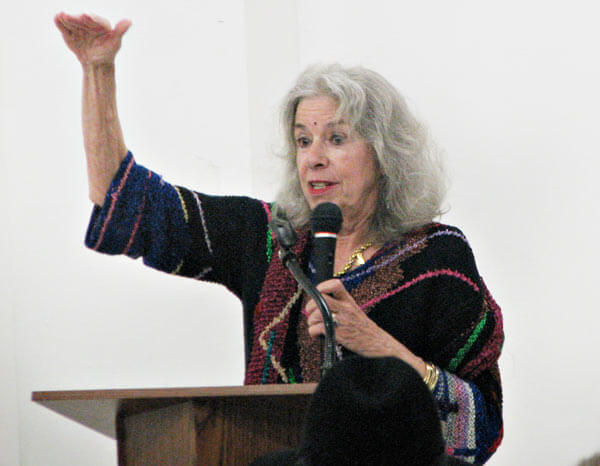By Steve Mosco
To say the Holocaust was a dark time in human history is an understatement; to say it was the last genocide is foolish, according to author Marione Ingram.
The writer, artist, civil rights activist and survivor visited the Central Queens Y in Forest Hills this week to mark Holocaust Memorial Day and to discuss her memoir, “The Hands of War.” Ingram grew up in Hamburg, Germany, during World War II, the daughter of a Jewish mother and German father. Her parents’ union kept them exempt from extermination until the final years of the war.
Her father forced to be a soldier in the German army, but he did not merely follow orders. Instead, he was part of an underground coalition of anti-Nazi soldiers. He actively worked against the Fatherland, feeding information to Allied forces and helping Jews escape.
It was during her father’s time in the army that neighbors reported her family to the Gestapo and they were forced into hiding. That was when the nightmare began.
“We were in Hamburg during the fire bombings,” said Ingram, 77, revealing the dreadful reality of a young girl watching bodies burn by high explosives, incendiary, phosphorus and napalm bombs dropped by British and American forces. “The memories of those 10 days and 10 nights always come back in a most painful manner.”
With their home bombed out, Ingram and her family sought refuge among the rubble and in craters carved from the earth by Allied bombings. And even with the loud explosions rumbling through the city, she swears she could hear the anguished screams of women and children burning to death.
“It was traumatizing seeing the people in flames,” she said. “They were living torches.”
The tortured cries would follow her even after she left Germany, which she and her family were able to do in a stroke of luck. Since their house was destroyed and Jews were denied access to bomb shelters, her entire family was presumed dead, this enabled them to slip into hiding and out of danger.
Ingram and her family were able to survive the final months of the war in hiding, living in constant fear and hunger.
After the war had ended, Ingram’s father wanted to remain in Germany and track down any Nazis who had gone into hiding. He felt since the family had survived, they had a duty to bring the Holocaust’s perpetrators to justice. The stress was too much, however, and Ingram’s parents’ divorced.
She immigrated to America, arriving in New York in 1952 and was immediately struck by the prevalence of racism toward African Americans.
“I recognized the abuse as being on the same level of what I experienced as a Jew,” she said. “Anyone can be singled out for being different. And all persecutions become one in the same.”
A young revolutionary, Ingram joined the civil rights movement in the 1960s and traveled to Mississippi where she helped to open a Freedom School — temporary free schools for African Americans in the South that were part of a nationwide effort to help achieve racial equality.
But she was not finished fighting discrimination as she faced harassment and threats from the Ku Klux Klan, who eventually torched her Freedom School.
She continues to use her horrible memories of Hamburg and her time in Mississippi as motivation to keep the fight going, to promote equality for people of all races and creeds.
“I am a lifelong pacifist. Wars and discrimination — they are killing contests,” she said. “I knew true horror as a 10-year-old. But now at 77, though I am still fighting, I am happy to be alive.”
Reach reporter Steve Mosco by e-mail at smosco@cnglocal.com or by phone at 718-260-4546.



































